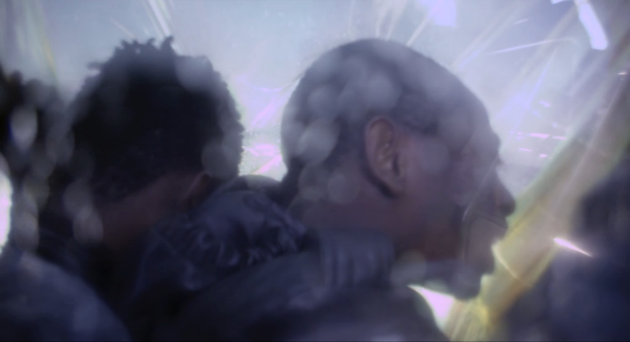
Europe's refugee crisis is perhaps the biggest humanitarian crisis the continent has ever experienced since the WWII. Gianfranco Rosi, an Italian filmmaker whose observational documentary Sacro GRA made a splash in 2014, here focuses more narrowly on Italy's refugee crisis on the island of Lampedusa, a tiny island between the African continent and Sicily- the case clearly being served as a synecdoche concerning the state of whole Europe. Fire at Sea a devastating look at the human toll juxtaposed with the old way of life the homogenic white Europe has enjoyed for years.
In a parallel action, we see the flight of refugees, mostly from North Africa and some from the Middle East crammed in on tiny ships, being rescued by Lampedusa's patrol team, armed with helicopters and patrol boats, then we follow Samuele, a typical engergetic school boy and his everyday life on the island.
Due to bad weather and communication problems, sometimes the rescue team get there too late. Reportedly 15,000 people lost their lives of starvation, exhaustion and drowning off the coast of the island.
Slingshot wielding Samuele is destined to be a fisherman, just like his father and grandfather and great-grandfather but only if he gets over his sea sickness first. He has a lazy eye problem and suffers from hyper tension.
A local medical doctor who experienced the human misery first hand, tells the harrowing account of what he witnessed - piles of dead bodies of women and children, chemical burns on bodies caused by diesel fuel mixed in with sea water, dehydration, hunger, etc. It's the same doctor who treats Samuele for his hypertension.
In a crowded refuge camp, harrowing journeys of refugees of watery death (or near death) are sung by a Nigerian preacher who continues to document their flight in oral tradition - they fled their home countries (Eritrea, Mali, Syria, Nigeria, Sudan...) because of bombs were going off, they crossed the Saharan desert, drinking their own piss, they were tortured and driven out from Libya, then they were forced out to sea.
But there are sparks of joy in the camps too, as makeshift soccer games between many different countries, resulting in momentary eruption of cheers and laughter.
We observe simple lives of the fishing village in the island - people requesting Sicilian love songs for their spouses on the radio, diving in a wet suit into a roiling sea for sea urchins, kids being kids without any interjection.
Fire at Sea refuses to be a rhetorical documentary. There are no narrations nor sit down interviews with locals or 'experts' about how they feel about the tides of Immigrants coming ashore or what could be done about it. It is more of a straight up reportage on the ground, simply showing the magnitude of the crisis that begs your attention and understanding.
And it is a gut wrenching experience at times. Bodybags, tears and wailing are as common as Samuele and his friends shooting airgun at the sky. Simply juxtaposing the crisis and the tranquil, simple, traditional lives which I'm sure have continued unchanged for hundreds of years, Rosi lets viewer to take in and think for themselves about the situation without judgment.
Fire at Sea won the Golden Bear at this year's Berlinale and was selected as the Italian entry for the Oscar for the Best Foreign Language film.
No comments:
Post a Comment